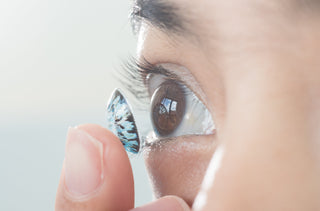Contact lenses are tiny, saucer-shaped pieces of plastic. They are placed on the eye's cornea and float on a thin layer of tear fluid. In some cases, contact lenses may offer better vision correction than glasses because they provide a more natural view. Contact lenses move with your eye and will not block what you see.
To take full advantage of the many benefits of contact lenses, here are some good habits to adopt and tips from our vision professionals to help you keep the most precious thing in your life healthy: your eyes.
- Read all the patient information pamphlets that come with your contact lenses.
- Clean and care for your contact lenses as your eye doctor recommends.
- Wash your hands thoroughly before handling contact lenses.
- Do not clean contact lenses with tap water or saliva.
- Do not change brands of cleaning solutions without consulting your eye care professional, as this may increase your risk of toxic reactions or irritation. Consult with your eye care professional to determine if the preservatives used in contact lens cleaning solutions will irritate your eyes.
- Do not exceed the time recommended by your trusted optometrist for contact lens wear.
- Remember that overnight contact lens wear, including extended-wear contact lenses, is associated with a risk of serious eye infection. Remove your contact lenses before going to bed.
- Never lend your contact lenses to another person.
- Avoid wearing temporary contact lenses that are part of a costume and are not approved by Health Canada and your optometrist.
- Keep "artificial tears," a wetting eye solution, or eyeglasses on hand if your eyes are likely to become dry or irritated.
- Remember that contact lenses do not provide eye protection. Wear appropriate eye protection when playing sports, such as field hockey or squash.
Your lifestyle also has an impact on your contact lens wear. Did you know that smokers are 8 times more likely to develop corneal ulcers than non-smokers, regardless of the type of contact lenses they wear?
Anything that can cause dry eyes, such as birth control pills, alcohol, air travel and allergy medications like antihistamines, can make contact lens wear uncomfortable and increase the risk of eye infection. Environmental contaminants, such as dust, smoke, sprays and pollen, can also irritate your eyes when you wear contact lenses.
Consult your IRIS professional for sound advice on contact lenses. You can discuss the different alternatives available to you for better vision and eye health.





















































